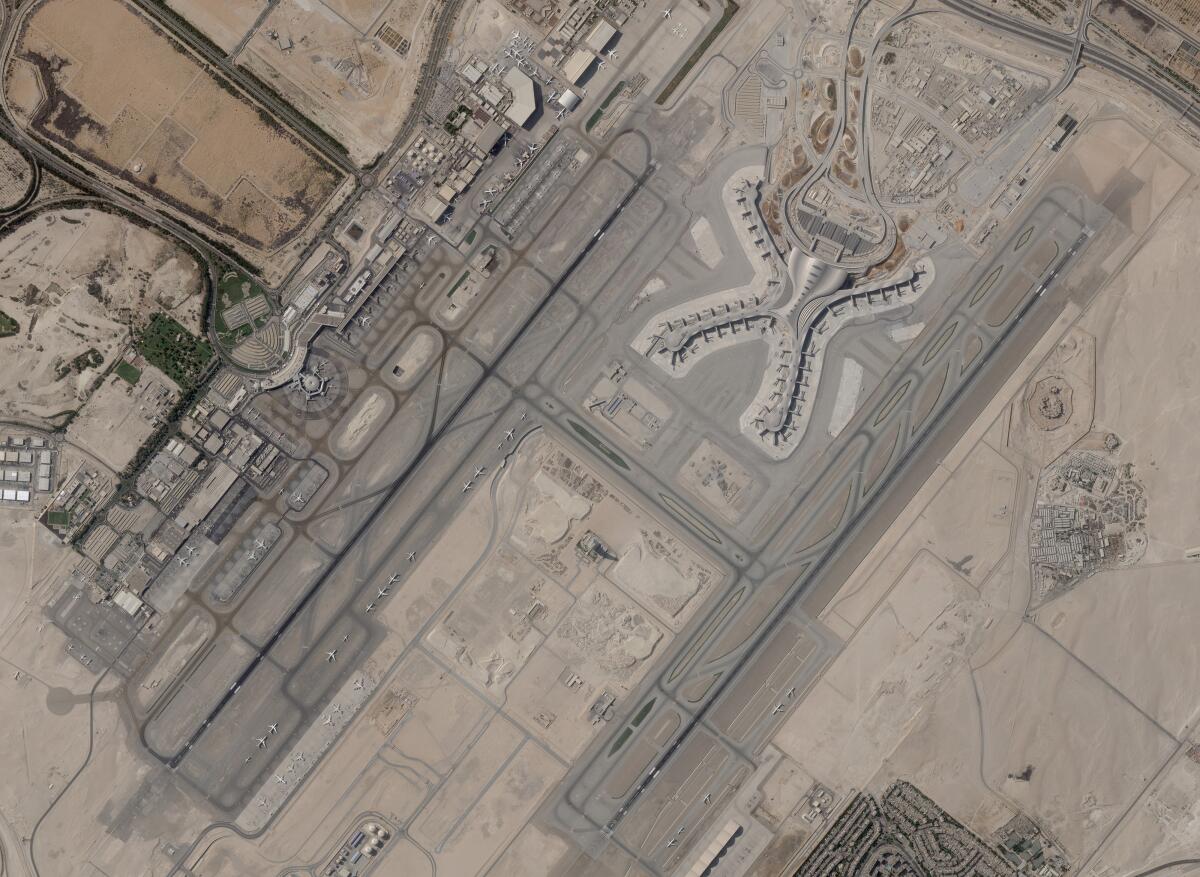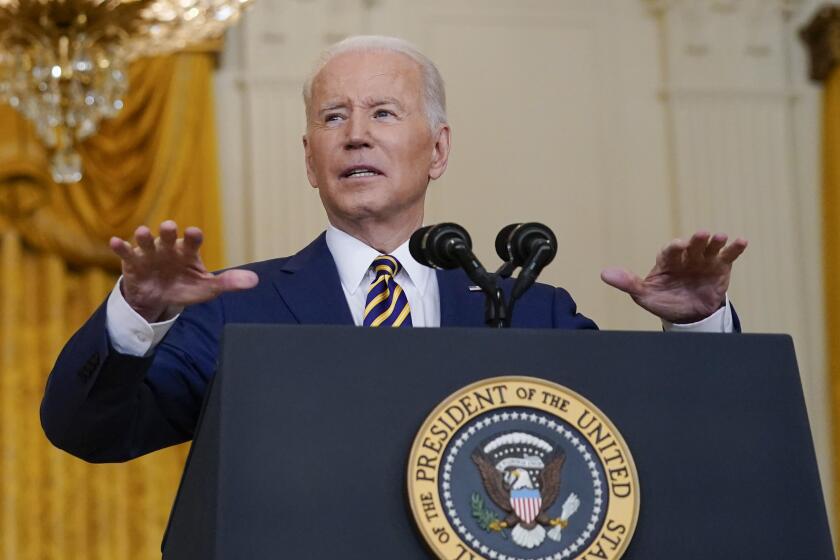Carnage escalates, options for U.S. diminish in new round of Yemeni civil war attacks

- Share via
BEIRUT — The swarm of drones and missiles traveled almost 1,000 miles before streaking over Abu Dhabi’s skyscrapers.
Some then split off toward the industrial district of Musaffah, just a few miles away from the United Arab Emirates’ Al Dhafra Airbase, where U.S. forces are stationed, and smacked into large petroleum trucks of the state-owned oil company. The blast killed three people and injured six others.
The rest swerved toward Abu Dhabi International Airport and started a small fire at a construction site on the periphery, authorities said.
The attack earlier this week, for which the Iran-backed Houthi militia claimed responsibility, sparked the latest escalation in Yemen’s grinding seven-year civil war. Within hours, warplanes from the Saudi-led coalition that includes the Emirates pummeled Sana, the Houthi-controlled capital, killing about 20 people. And early Friday, further air retaliation from the coalition resulted in at least 82 reported civilian deaths and the internet being cut off for an entire city.
The tit-for-tat carnage underscores the complicated and often deadly calculus facing the U.S. in an ongoing conflict that appears to have only bad options.
The Houthis, members of a Shiite movement that has fought the Yemeni government for decades, first snatched control of Sana in 2014 before turning to the nation’s southern regions in a bid to seize full control of the country. Saudi Arabia, a Sunni Muslim nation, fearing that Houthi control would allow its regional Shiite adversary, Iran, to establish a foothold near its border, assembled a coalition with allies. It also launched — with U.S. assistance — a punishing air campaign as well as a land and sea blockade to support Yemen’s government in exile.
President Biden’s comment that future elections might not be legitimate because of new GOP voting restrictions sparked criticism from Republicans and democracy watchers, prompting a walk-back Thursday by the White House.
Over time, hundreds of thousands of Yemenis have been killed in coalition airstrikes and ground combat or have starved to death — all of which have led the United Nations to declare Yemen the world’s worst humanitarian crisis.
Though the Houthis regularly exchange missile fire with the Saudis, the Emirates had been spared since withdrawing its troops from Yemen in 2019, while continuing to train and assist anti-Houthi paramilitary groups. Those groups — along with Emirati drones deployed above them — were instrumental in pushing back the Houthis from Shabwa, a strategic, oil-rich province seen as a linchpin for controlling Yemen’s south and which the Houthis almost captured late last year.
“There had been an implicit and very valuable understanding between the Houthis and the UAE that they wouldn’t confront each other directly,” said Thomas Juneau, a Yemen expert at the University of Ottawa.
But the Houthis’ campaign in Shabwa challenged that understanding, he added, and Monday’s air attack opened a new, bloody chapter in the conflict.
On Wednesday, the Emirates’ ambassador and national intelligence director met with U.S. officials at the White House and the Capitol, while Defense Secretary Lloyd J. Austin III called Emirati Crown Prince Mohammed bin Zayed and “underscored his unwavering support for the security and defense of UAE territory against all threats,” according to a Pentagon statement.
The ambassador, Yousef Otaiba, also launched a concerted effort urging the Biden administration to redesignate the Houthis as a terrorist organization.
President Biden, seeking to end the civil war as he also makes efforts to reinstitute a nuclear accord with Iran abandoned by then-President Trump, had reversed the eleventh-hour terror designation of the Houthis in the last days of the Trump administration. Biden has also halted support for the Saudi-led coalition’s offensive operations and dispatched a veteran diplomat, Tim Lenderking, as special envoy to Yemen.
Asked on Wednesday whether he would now go ahead with the redesignation, Biden replied at a news conference that it was “under consideration.”
“Ending the war in Yemen takes the two parties to be involved to do it,” he added. “And it’s going to be very difficult.”
The Emirates said in a statement that it “welcomed” Biden’s considering the redesignation.
“Case is clear — launching ballistic and cruise missiles against civilian targets, sustaining aggression, diverting aid from Yemeni people,” tweeted the Emirati Embassy’s account on Twitter.
But it remains unclear whether such a step would bring results, experts say, and, given the deadly toll of the retaliation, whether such a step remains warranted.
“The airstrikes and [foreign terrorist organization] designation point once again to the limits of international leverage over the Houthis,” said Peter Salisbury, a Yemen specialist with the International Crisis Group. “And the problem is that a bad idea in the absence of a better alternative doesn’t become a better idea.”
This week brought stark confirmation of the ongoing toll of the conflict. The Saudi-led coalition airstrikes left at least 82 prisoners dead and 265 wounded at a prison in Saada, a Houthi-run northern Yemeni city, according to Doctors Without Borders.
Other airstrikes targeted Sana’s airport and a telecommunications center in the coastal city of Hudaydah, shutting off internet for TeleYemen, which serves as the main service provider in the country. Netblocks, a group that monitors telecommunications disruptions, said “internet effectively remains entirely offline a day later,” hampering humanitarian and rescue efforts.
Aid groups that had protested the terrorist designation last year because of legal obstacles it would impose on humanitarian deliveries to Houthi-controlled areas are raising the alarm again.
“The Biden administration didn’t make a decision to reverse this designation because of the Houthis’ conduct. They did it because of the devastating humanitarian consequences it would have, and moreover because it wouldn’t be effective diplomatically,” said Scott Paul, Oxfam America’s humanitarian policy lead, in a phone interview. “Nothing has changed from a year ago. This is high-stakes name-calling, and it’s Yemenis across the country that would pay the price.”
Pressing on with a military offensive is also likely to spur more Houthi attacks on the Emirates — anathema for a country that bills itself as a mecca for the business-first pragmatists in the region. And defending cities such as Abu Dhabi and Dubai against drones and missiles with current weapons systems isn’t feasible, said Michael Knights, an analyst with the Washington Institute for Near East Policy.
“The Emiratis want directed-energy weapons and interception way out of the cities,” Knights said, adding that such programs were still in their infancy. Meanwhile, Israel’s leaders have raised the possibility of selling the country’s Iron Dome antimissile system to the Emirates and Saudi Arabia.
The ongoing hostilities have also affected shipping. The Houthis hijacked an Emirati-flagged tanker, the Rwabee, early this month. The vessel and the crew are still held, Houthi officials said, pending a legal case for breaching Yemen’s territorial waters.
The backdrop to the attacks is the U.S.’ diplomatic engagement with Iran over its nuclear weapons development program. That has left Saudi Arabia and the Emirates, both cheerleaders of the Trump administration’s “maximum pressure” campaign on Tehran, seeking their own rapprochement with their longtime adversary, even as they insist, along with the U.S. and Israel, that Iran directs the Houthis and has supplied them with advanced weaponry to wage their attacks as part of a network of Iran-backed militias across the region. (In recent days, Iran-linked militias in Iraq had also issued threats against the Emirates, hinting at some kind of coordination.)
Iranian leaders contend the Houthis are fighting their own battles and deny supplying them with advanced weapons.
The Emirates, which also hopes to renew economic links with Iran, has led reengagement efforts. Last year, it dispatched its national security advisor to meet with Iranian President Ebrahim Raisi in Tehran and invited him to visit in February. That invitation has yet to be rescinded after the Houthis’ strike nor have Emirati officials named Iran in their statements of condemnation.
“The UAE is after two tracks when it comes to Iran: Confront Iranian militias and Tehran’s tentacles in the region and now in Yemen, so we’re pushing on that military side while at the same time we’re handling the diplomatic track,” said Abdulkhaleq Abdulla, an Emirati political science professor.
The Houthis contend their arsenal is locally manufactured. A confidential U.N. Security Council report viewed by the Los Angeles Times said the Houthis build most of their missiles and rockets using local materials, as well as components sourced from abroad through a complex web of intermediaries in Europe, the Middle East and Asia.
Houthi officials say they have no need to coordinate such attacks with anyone.
“We have a very large war being waged against us; isn’t that justification enough to respond to this aggression? We were defending ourselves back when we didn’t have these capabilities,” said Nasr al-Din Amir, deputy chief of the Houthis’ ministry of information, vowing that the group would attack anyone who attacked it. “Let the world today end the nuclear standoff with Iran. If it happens and the war upon us continues, then we’ll continue fighting.”
In the meantime, said Ahmed Nagi, a nonresident scholar at the Malcolm H. Kerr Carnegie Middle East Center, that has left policymakers in a quandary.
“Either you go for escalation, and expect drones and attacks from your sides. The other option is to surrender to the Houthis’ conditions and withdraw … or you try to achieve a military stalemate and work on the diplomatic track,” Nagi said.
But with the Houthis unwilling to meet even with the U.N. envoy, that balance may be hard to achieve, said Mohammed Basha, a Yemen expert at the U.S.-based Navanti Group, a consulting firm.
“The path for peace and stability in Yemen seems far-fetched at this stage,” he said. “Houthi leadership had gone on the record and said they will not stop military operations until every inch of Yemen is liberated.”
More to Read
Sign up for Essential California
The most important California stories and recommendations in your inbox every morning.
You may occasionally receive promotional content from the Los Angeles Times.















